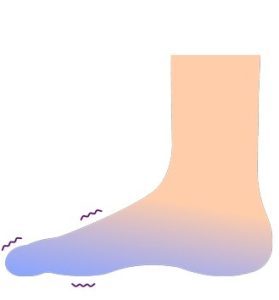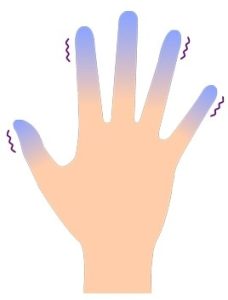Cold feet
Many people regularly suffer from cold feet. Want to know all the details? Read our blog article full of information and tips.
The constant feeling of being cold can be frustrating and unsettling. You’re in a heated house, wearing multiple layers of clothing, and yet the cold seems never-ending. This could be more than just temporary discomfort; there may be medical, physiological, or even psychological reasons behind it. In this article, we’ll explore some of the most common reasons why you always feel cold and what you can do about it—and hopefully, we’ll also warm you up a bit with some useful information.

Body fat acts as your personal insulation package. People with a low percentage of body fat may be more susceptible to the cold. Similarly, muscles play a role in generating heat; less muscle mass can also contribute to feeling cold. Regular physical exercise can help maintain both your fat and muscle mass, allowing your body to keep you warmer.
Your metabolism is like an internal furnace that converts calories into energy. If your furnace is running on low, your body might struggle to produce enough heat. Factors such as age, genetics, and diet can affect your metabolism. Increasing your calorie intake with foods that give your metabolism a boost, such as proteins and spicy dishes, can help keep your body temperature regulated.


If your thyroid isn’t functioning properly, for example, in cases of hypothyroidism (underactive thyroid), your body might be the worst chef when it comes to regulating your body temperature. Besides feeling cold, you might experience fatigue, weight gain, and dry skin. Time for a check-up with your doctor!
Anemia is when your blood lacks red blood cells, and without these ‘conveyor belts,’ your limbs can feel like icy storage boxes. People with anemia might also feel tired, weak, and pale. Ensure your iron and vitamin B12 levels are adequate so your blood can happily do its job.
Circulation issues can contribute to a constant cold feeling. Factors like prolonged sitting, smoking, diabetes, high blood pressure, or Raynaud’s syndrome can hinder blood flow to your hands and feet. When circulation decreases, your extremities (hands, feet, ears, and tip of your nose, and then your arms and legs) don’t receive enough blood and warmth, leading to a persistent cold feeling. This is because reduced blood flow limits heat transfer to your hands and feet, making them feel colder.


If you’re exposed to cold environments and your home is poorly insulated, it can feel like you’ve created your own winter wonderland. It’s important to properly insulate your living space and adjust your clothing to the weather to ensure your body stays warm.
Humidity also plays a role in how you experience warmth. In a humid environment, your body might not retain heat as effectively, which can feel like a constant draft. Using a dehumidifier can help manage the humidity in your home and reduce the cold feeling.


Stress and anxiety can impact your body temperature as if you have an invisible cold-water stream. Stress can affect blood flow to your skin and cause a cold feeling. Relaxation techniques, mindfulness, and seeking professional help can help reduce stress and get your temperature back to normal.
Chronic fatigue can also contribute to an increased feeling of cold. When your body is exhausted, it has less energy to regulate your body temperature. Ensure you get enough sleep and take time to rest so your energy levels can recover and you feel more comfortable.


If you constantly feel cold, it’s time to look for the cause. Start with a visit to your doctor to rule out possible medical conditions. Make sure to adjust your diet and exercise to improve your metabolism and muscle mass. Additionally, you can adjust your environment by ensuring good insulation and protecting yourself from moisture and cold. Wearing heated clothing can also be an effective solution to help you feel comfortable and warm.
For specific problems like cold feet or hands, we have separate articles that you might find useful.
These articles offer practical tips and solutions for these common issues, so you can better prepare for dealing with the cold: These articles offer practical tips and solutions for these common issues, so you can better prepare for dealing with the cold:

Many people regularly suffer from cold feet. Want to know all the details? Read our blog article full of information and tips.

Cold hands are no fun. We’ve delved thoroughly into this topic. In our blog article, you can read all about it!
Constantly feeling cold is not something you should live with without taking action. By identifying the possible causes and taking appropriate measures, you can improve your well-being and lead a more comfortable life, regardless of the temperature outside. One of those measures could be wearing heated clothing, such as a heated jacket, heated vest, and heated underwear. These garments help you stay comfortably and warmly in a simple and quick way. Stay warm!